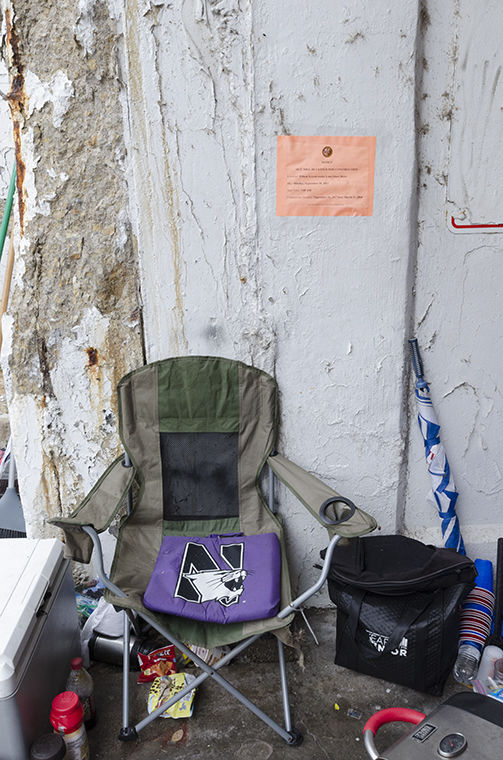Tent City future at stake over bike paths
September 5, 2017
A bright orange warning sign plastered on a viaduct wall below Lake Shore Drive in Uptown tells 50 or so homeless residents who have found refuge there that they will be forced to move.
The construction notice—the sole eviction warning—alerted Tent City residents that they have until Sept. 18 at 7 a.m. to pack up whatever belongings they have and leave. Tent City is a homeless encampment on the wide sidewalks below the Lawrence and Wilson avenue bridge viaducts. The city plans to build bike paths where the tents currently sit, leaving the homeless community at risk of permanent displacement.
“This kind of egregious civil rights attack is something that we’re [not just] going to sit down and let happen,” said Andy Thayer, a member of Uptown Tent City Organizers—a volunteer advocacy group that has donated tents to residents. “We want to have a place where people can go and not be hassled by the city if and when the construction begins.”
The city’s actions have led the organization, along with the Uptown People’s Law Center, to take legal action to halt the order. The law center works with Uptown residents on issues such as tenants’ rights and social security disability.
Thayer said last year UTCO started to scout places the homeless people at the encampment could stay if evicted. People were relocated to an empty lot at the permanently closed Graeme Stewart Elementary School, 4525 N. Kenmore Ave., which was bought by a real estate developer, Morningside, in January 2016. The company plans to build luxury housing, but the site had been left untouched for months. Unfortunately, in September 2016, the city refused to allow Tent City residents to continue their stay on the grassy lot and were told to move, Thayer said.
“Ald. James Cappleman [46th Ward] has been doing everything he can to make Uptown a place where people who are poor don’t feel comfortable and get pushed out of the ward,” Thayer said. “This is not only an injustice, but also a violation of people’s basic civil rights.”
With nowhere else for residents to go, UTCO filed an injunction in federal court on Aug. 1 to halt construction until the city provides housing or allows them to go to a secure place, according to Thayer. Cappleman’s office and the Chicago Department of Family Support and Services did not respond to requests for comment as of press time.
UPLC’s lawsuit, filed May 17, attempts to order the city to find housing for Tent City residents by the time construction starts Sept. 18, said Alan Mills, executive director of UPLC. The plaintiffs are asking the court to delay construction if the city cannot find a solution within 30 days.
“They need a plan for what to do with folks they are moving from under those bridges,” Mills said. “It’s a public works project and the public has a responsibility for the people being displaced in order to do that work.”
Shelters such as North Side Housing and Support Services, 941 W. Lawrence Ave., have said they will accept Tent City residents. North Side will do its best to work with the city to house as many people as possible while also maintaining city safety codes, said Richard Ducatenzeiler, the shelter’s executive director.
“We also have to make sure we are adhering to fire code standards and safety, but we will obviously do our best in trying to accommodate as many people as possible,” he said.
Tent City’s population is too large for shelters to accommodate the possible influx, said Dick Simpson, a political science professor at the University of Illinois at Chicago and former 44th Ward alderman. Tent City residents enjoy living there because it is safe, and they have made it into a home, he added.
The homeless community was established after an August 2015 Mumford and Sons concert on the North Side prompted the city to clear out the homeless population that was staying beneath the Lawrence and Wilson avenue bridges, Mills said. However, the Uptown community rallied to help the homeless when the police tried to prevent them from returning after the concert ended, he said.
Although Mills said he understands the need for bridge repairs and the dangers of not vacating the premises while they are ongoing, he stressed the need for a cohesive plan before the city begins the repairs.
“Nobody thinks that a tent outside is their first choice. They should have houses,” Mills said, “but until the city does that, what we hope is that they will have a safe, visible place to stay.”








